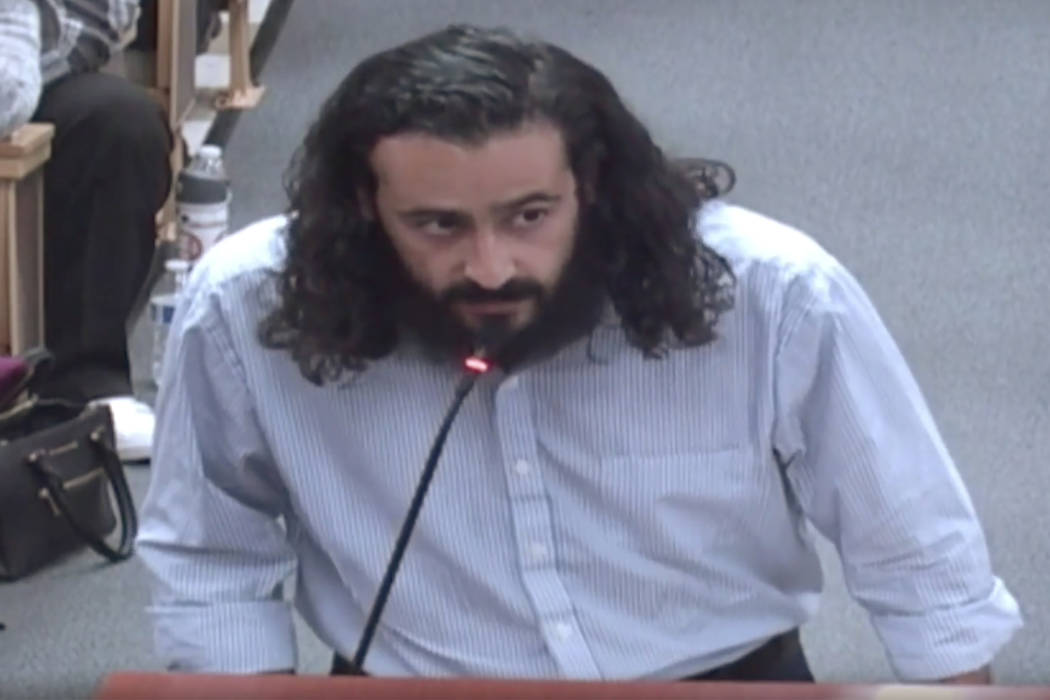Clark County substitute teachers pursue better pay, benefits
Facing a Monday deadline for semester grades, Clark County teachers like Fernando Valenzuela have been spending big chunks of their winter break grading final papers and exams. But as a long-term substitute teacher, Valenzuela won’t be paid for the work he put in over the last two weeks.
Valenzuela says the lack of holiday pay is just one shortcoming of working for the Clark County School District, arguing that he and his fellow substitutes perform the same duties as full-time classroom teachers, but for less pay and without benefits like health insurance.
He recently presented these concerns at a School Board meeting and launched an online petition in an effort to rally support for changes, including a pay raise for substitute teachers. While full-time teachers, administrators and staff at CCSD received 3 percent raises last year under a contract that also included provisions for additional pay hikes, substitute teachers note they haven’t seen one in more than a decade.
“The inadequate pay we receive is simply not enough to be considered a living wage,” Valenzuela told the board members on Dec. 12. “Considering the fact that substitutes have played an essential role in alleviating the burden of the teacher shortage, I believe it is both reasonable and appropriate to begin a serious discussion about material changes, including higher wages and better health insurance.”
4,500 substitutes
There are around 4,500 substitutes who work at least occasionally at CCSD schools, helping the district fill the 750 teaching vacancies it reported at the beginning of the 2019-2020 year. The district had anticipated the need for even more substitutes when it faced a threatened teachers strike at the beginning of the current school year, prompting it to offer to waive the fingerprint costs for retired teachers and college students who would be willing to cross a picket line.
District officials said long-term substitute teachers are currently filling 664 teacher vacancies but did not respond to an interview request sent Friday about substitutes’ scheduling and pay.
The starting rate for CCSD subs is $90 per day, or about $12.50 an hour, though the rate goes up for those filling vacancies ($110 per day) or teaching in at-risk schools ($150 per day). The starting rate is approximately on par with the base rate at Washoe County Schools, but other similarly sized districts across the country tend to pay long-term substitutes significantly more.
In Broward County Schools, for example, the starting rate is around $84 per day, but subs who have been in their spots for at least 20 days can expect to make $204 per day.
Substitutes in Los Angeles Unified qualify for paid sick days after 90 days of work and receive health benefits after 600 hours of work. The starting rate for day-to-day subs is $202 per day.
Without holiday pay and health insurance, the CCSD rate works out to poverty wages, according to a substitute named Cheyenne, who spoke with the Review-Journal on the condition that her last name not be used out of concern that she would be not be hired again for speaking out.
In addition to covering the class she’s scheduled to teach, Cheyenne says she’s often asked to make copies, grade papers and create lesson plans during her 30-minute lunch, or even step in for other classes missing a teacher during her prep period for no additional money.
“I try not to go to the bathroom unless absolutely necessary because a hall monitor has to come and cover the class,” she said. “I don’t know of any job where people can’t take a quick restroom break.”
She noted that long-term substitute teaching assignments are attractive for the stability. But short-term positions also allow teachers to work almost every day, though they may have to make long commutes on short notice for some assignments.
When a substitute can’t be found, full-time teachers are often asked to give up their prep periods for hourly rate pay or take additional students into their classrooms. An informal survey by a CCSD teacher on Facebook found that policies on whether teachers are paid to take on additional students vary from school to school.
Cheyenne said she sees teacher shortages and overworked substitutes as national issues that go hand-in-hand.
“This isn’t just a CCSD issue,” she said. “It’s happening nationwide and people need to look into why teachers are quitting at high rates and why there’s such a shortage of teachers and subs in districts.”
Vacancies and full-time substitutes
Valenzuela, who began teaching at CCSD this year after a classroom stint in Spain, said that in addition to low wages, he goes without a paycheck during breaks, federal holidays and sick days since he’s only paid for the days he’s on-site and teaching.
And if he were to get sick, Valenzuela said, substitutes don’t qualify for health insurance until their second year of teaching, and even then, the plans can be prohibitively expensive.
“I understand the district not wanting to pay for the days we don’t work. I understand that it could be a funding issue,” Valenzuela said. “But it’s really a priority. If we can pass legislation to build the Raiders a stadium, we can find the funding for this.”
On social media, critics have accused vocal substitute teachers of wanting the same rewards as full-time teachers without putting in the required work, saying they should take time to earn their master’s degrees and advanced licenses.
But Valenzuela notes that the path to full-time teaching is not always a viable one for substitutes, who may be retirees or young college graduates unable to make the time or money commitments.
And substitutes who do make the leap sometimes encounter roadblocks and delays to meet all the professional requirements needed for teaching.
Jason Coffey, a CCSD substitute since 2014, said he chose the profession after the Recession because he saw a steady demand for subs.
But he decided to transition to teaching full-time after several years working as a substitute confirmed for him that he enjoyed the work.
“The core of why I got into teaching was to help others make better life choices with their education than I did,” Coffey said.
Since earning a bachelor’s degree in May, he’s been enrolled in UNLV’s Alternative Route to Licensure program, which fast-tracks would-be teachers in Nevada. But even with a history as a sub at CCSD and a completed PRAXIS test certifying his competence, Coffey says he’s running into administrative issues with the employment and student portals at CCSD and UNLV that have slowed his progress.
After those issues are sorted, Coffey said he’ll face a tight timeline to meet a laundry list of requirements, including 90 days to attain a conditional license from the Nevada Department of Education, and two more years at UNLV to complete his master’s degree.
“I have till Feb. 28 to see if I can land an interview (with a principal) that results in a note for a contract, which ensures I get paid over the summer, like a real teacher,” he said.
Contact Aleksandra Appleton at 702-383-0218 or aappleton@reviewjournal.com. Follow @aleksappleton on Twitter.























